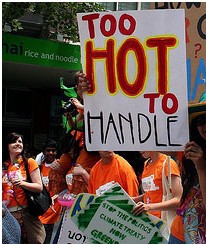
The month of May was the hottest in recorded history, a dire finding for scientists warning of global warming.
The National Oceanic and Atmospheric Administration announced Monday that May 2014 was the hottest May since records started being kept in the mid 20th century. The research found that land and sea surfaces were 1.33 degrees Fahrenheit above the 20th Century average of 58.6 degrees.
The steamy month of May was not a one-off, the NOAA warned.
“Four of the five warmest Mays on record have occurred in the past five years,” the NOAA also wrote in its report.
El Niño last made an appearance in 1997, climate scientists believe there is an 80 percent chance it will return by the fall.
“I don’t think we’ve seen anything like this before,” said Kevin Trenberth, a climate scientist at the National Center for Atmospheric Research.
The effects of global warming are being seen elsewhere. Researchers have found that glaciers in Antarctica are melting at a fast rate, and elsewhere sea levels are rising.
The higher waters have even uncovered graves of dead WWII soldiers on the Marshall Islands.
“These last spring tides in February to April this year have caused not just inundation and flooding of communities but have also undermined regular land, so that even the dead are affected,” said Republic of the Marshall Islands Foreign Minister Tony De Brum, at the United Nations climate negotiations in Bonn, Germany.
He added, “There are coffins and dead people being washed away from graves, it’s that serious.”
Scientists say the effects of global warming are clear when looking at the previous hottest month of May ever, which was just four years ago.

